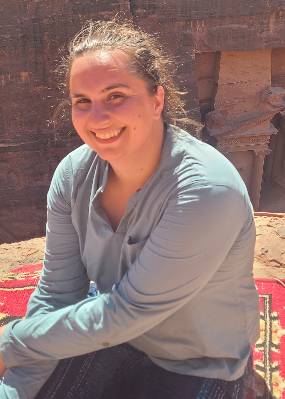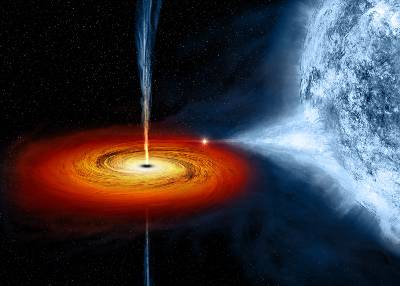Former NatSci Ph.D. student earns prestigious NASA Fellowship
How does the universe work? How did we get here? Are we alone?

Michigan State Ph.D. graduate Kristen Dage (astrophysics, '20) is the first MSU Ph.D. student to receive a NASA Hubble Fellowship Program award. Credit: Enid Dage
Fellows at the National Aeronautics and Space Administration (NASA) are working hard to answer these big questions. Each year, an elite group of postdoctoral researchers become part of NASA’s Hubble Fellowship Program (NHFP). Kristen Dage, who received her Ph.D. from Michigan State University in astrophysics in July 2020, was selected to join the 2023 NHFP cohort. This is the first time an MSU Ph.D. student has received this honor.
Twenty-four scientists were selected from over 450 applications to receive Hubble Fellowships this year. The prestigious international program affords awardees the opportunity to further their “independent research in any area of NASA astrophysics, using theory, observations, simulations, experimentation, or instrument development.” Each fellow receives up to three years of funding at a U.S. host university or research center of their choice.
Once a fellow is chosen, they are assigned to a category based on NHFP’s three main questions: Einstein Fellows work to answer how the universe works, Hubble Fellows focus on how we got here, and Sagan Fellows hunt for evidence to shed light on if we are alone.
Dage was awarded an Einstein Hubble Fellowship.
Stephen Zepf, chair of the MSU Department of Physics and Astronomy in the College of Natural Science, was Dage’s advisor. Last year, when Elias Aydi chose MSU as his host institution for the fellowship, it was the first time someone had chosen to take their Hubble fellowship at MSU.
Zepf said that Dage receiving the Hubble award is another sign of success for MSU’s astronomy program.
“The NHFP is the most prestigious postdoctoral fellowship in all of astronomy, and Dr. Dage is truly deserving of this award,” he said. “I am doubly proud of Kristen, both as department chair and as her Ph.D. advisor. Dr. Dage's NHFP also indicates the growth of our astronomy Ph.D. program, which started 25 years ago with the goal of becoming a program from which our students could win awards such as this.”

Thousands upon thousands of stars illuminate this breathtaking image of star cluster Liller 1, imaged with Hubble’s Wide Field Camera 3. This stellar system, located 30,000 light-years from Earth, formed stars over 11 billion years. Credits: ESA/Hubble & NASA, F. Ferraro
Dage is currently a Fonds de recherche du Québec – Nature et technologies (FRQNT) postdoctoral fellow at the McGill Space Institute in Montreal, Quebec. Using multiwavelength observations, she identifies objects in extreme gravitational environments and characterizes their physics.
For Dage, becoming a Hubble Einstein Fellow allows her to explore fundamental questions about intermediate mass black holes, a rare class of black holes which are at the heart of many open questions in astronomy. She will begin her fellowship project Hunting for Accreting Black Holes in Young Massive Clusters at Wayne State University, Detroit, Mich., this fall.
“It is very exciting and a great honor to receive the NASA Hubble Einstein Fellowship,” Dage said. “I'm especially grateful to the many wonderful people at MSU who supported me in my career, enabling me to successfully apply and be selected for this award. One of the aspects I'm most excited about is being able to perform unique, cutting-edge research in astrophysics with the aid of freshmen and sophomore student assistants at Henry Ford College in Dearborn, Mich. It is fantastic and incredibly meaningful to me to be able to give back to students and to work with the next generation of scientists.”
Over the next few years, Dage and the rest of the 2023 NHFP cohort will be busy. While they may not get all the answers to how the universe works, they should get us at least a few steps closer.
The Space Telescope Science Institute administers the NHFP on behalf of NASA, in collaboration with the NASA Exoplanet Science Institute at the California Institute of Technology and the Chandra X-ray Center at the Smithsonian Astrophysical Observatory.
Banner image: Artist's representation of an X-ray binary. Credit: NASA/CXC/M.Weiss